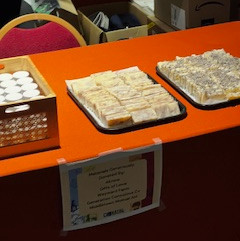Mutual Aid with Basic Human Needs
- Lorenzo Jones
- Mar 22
- 3 min read
Updated: Mar 24
Establishing direct connections between Connecticut farmers who produce food and residents facing food insecurity in the state seems logical. But how difficult is it? Very!
With less than 2% of the farmers in Connecticut identifying as being Black or Brown people or People of Color there are minimal resources for private food production. There is scarce infrastructure accessible to local families to start and sustain farm projects that could produce food. We have been working to address this.
Our Farm Committee of startup farmers assists people to start local farming and produce their own food. Since 2022, our Farm Committee have run a basic human needs program coupled with, mutual aid work that makes fresh produce, grown by bilpoc and socially disadvantaged farmers in Connecticut available in underserved neighborhoods.
This project has been called #coop2kitchen. #coop2kitchen is supported by students and our Cultivating Justice members by volunteering labor animal husbandry, planting, harvesting, providing fresh food to elders, children and families in Bloomfield and Hartford, CT.
In 2023, we expanded this project to Middletown through a partnership with Dees Crafty Bees to start a chicken coop with layer hens for the Miller Street Community Farm. This chicken coop and the raised grow beds are located in a community park and free to the public. Miller Street Community Park is a partnership with this community park produced fresh vegetables, eggs, herbs and crafts for residents and our members across the state.

We've focused our mutual aid work in Bloomfield, Hartford, Manchester, and Middletown with some informal case management with the help of health professionals.
Our objectives for this work:
Produce food, Feed People
Connect CT farmers to our members
Teach scalable farming and growing
In 2024, with the help our Farmers & Leaders of Color Lovie's Farm and Morena Farm we added 4 acres of growing and animals to our project. This increased the food we produced. Aknew also helped us to start adding basic human needs items like hygiene products, craft supplies, harm reduction supplies, laundry sheets, and specific things depending on the time of year.
The Farm Committee has been able to get supplies and stipend support from Sustainable CT Community Match Fund. Other support for our mutual aid work comes from individual donors, foundations, in-kind donations, and corporate sponsorships, The funds raised go to pay for seeds, stipends to farmers, agriculture agreements for produce, building and repair materials, farm tools, and livestock including, chickens, quail, honey bees, goats, and ducks. The Farm Committee will stipend farmers, producers, and growers for fresh eggs, dairy products, crops and vegetables, and fresh herbs for our mutual aid work
We make the distinction between people producing their own food and the direct services that 'provide food' to people. Mutual aid should not be narrowly defined as food access but it needs to build bridges that increases access to food for families.
The Farm Committee builds partnerships for #coop2kitchen that include farmers, public health professionals, harm reductionists, educators, and parents.
Our mutual aid work includes partnerships with New and existing farmers that work with our startup farmers and members to produce the food we give to people living in underserved neighborhoods.
This year we've identified rural farmers in New Haven and Hartford counties with diary, cheese, soap making, poultry eggs, salves, balms, and other products that will help diversify our inventory. This will multiply our positive impact on the tables and medicine cabinets of people directly impacted by the state's failed social safety net
Our partners for #coop2kitchen
To become a partner contact our Agriculture Director, Diana Martinez for a conversation Diana@chicksahoyfarm.org
































